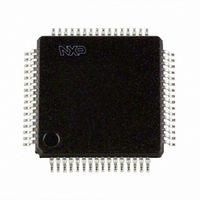LPC2119FBD64,151 NXP Semiconductors, LPC2119FBD64,151 Datasheet - Page 22

LPC2119FBD64,151
Manufacturer Part Number
LPC2119FBD64,151
Description
IC ARM1 MCU FLASH 128K 64-LQFP
Manufacturer
NXP Semiconductors
Series
LPC2100r
Datasheet
1.LPC2109FBD640115.pdf
(44 pages)
Specifications of LPC2119FBD64,151
Core Processor
ARM7
Core Size
16/32-Bit
Speed
60MHz
Connectivity
CAN, I²C, Microwire, SPI, SSI, SSP, UART/USART
Peripherals
POR, PWM, WDT
Number Of I /o
46
Program Memory Size
128KB (128K x 8)
Program Memory Type
FLASH
Ram Size
16K x 8
Voltage - Supply (vcc/vdd)
1.65 V ~ 3.6 V
Data Converters
A/D 4x10b
Oscillator Type
Internal
Operating Temperature
-40°C ~ 85°C
Package / Case
64-LQFP
For Use With
MCB2100 - BOARD EVAL NXP LPC211X/LPC212X
Lead Free Status / RoHS Status
Lead free / RoHS Compliant
Eeprom Size
-
Other names
568-1223
935274736151
LPC2119FBD64-S
935274736151
LPC2119FBD64-S
Available stocks
Company
Part Number
Manufacturer
Quantity
Price
Company:
Part Number:
LPC2119FBD64,151
Manufacturer:
NXP Semiconductors
Quantity:
10 000
NXP Semiconductors
Product data sheet
LPC2109_2119_2129_6
CAUTION
6.18.5 External interrupt inputs
6.18.6 Memory mapping control
6.18.7 Power control
CRP1 disables access to chip via the JTAG and allows partial flash update (excluding
flash sector 0) using a limited set of the ISP commands. This mode is useful when CRP is
required and flash field updates are needed but all sectors can not be erased.
CRP2 disables access to chip via the JTAG and only allows full flash erase and update
using a reduced set of the ISP commands.
Running an application with level CRP3 selected fully disables any access to chip via the
JTAG pins and the ISP. This mode effectively disables ISP override using P0[14] pin, too. It
is up to the user’s application to provide (if needed) flash update mechanism using IAP
calls or call reinvoke ISP command to enable flash update via UART0.
Remark: Devices without the suffix /00 or /01 have only a security level equivalent to
CRP2 available.
The LPC2109/2119/2129 include up to nine edge or level sensitive External Interrupt
Inputs as selectable pin functions. When the pins are combined, external events can be
processed as four independent interrupt signals. The External Interrupt Inputs can
optionally be used to wake up the processor from Power-down mode.
The Memory Mapping Control alters the mapping of the interrupt vectors that appear
beginning at address 0x0000 0000. Vectors may be mapped to the bottom of the on-chip
flash memory, or to the on-chip static RAM. This allows code running in different memory
spaces to have control of the interrupts.
The LPC2109/2119/2129 support two reduced power modes: Idle mode and Power-down
mode. In Idle mode, execution of instructions is suspended until either a Reset or interrupt
occurs. Peripheral functions continue operation during Idle mode and may generate
interrupts to cause the processor to resume execution. Idle mode eliminates power used
by the processor itself, memory systems and related controllers, and internal buses.
In Power-down mode, the oscillator is shut down and the chip receives no internal clocks.
The processor state and registers, peripheral registers, and internal SRAM values are
preserved throughout Power-down mode and the logic levels of chip output pins remain
static. The Power-down mode can be terminated and normal operation resumed by either
a Reset or certain specific interrupts that are able to function without clocks. Since all
dynamic operation of the chip is suspended, Power-down mode reduces chip power
consumption to nearly zero.
A Power Control for Peripherals feature allows individual peripherals to be turned off if
they are not needed in the application, resulting in additional power savings.
If level three Code Read Protection (CRP3) is selected, no future factory testing can be
performed on the device.
Rev. 06 — 10 December 2007
LPC2109/2119/2129
Single-chip 16/32-bit microcontrollers
© NXP B.V. 2007. All rights reserved.
22 of 44
















